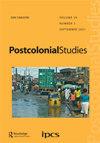Falling into history: a case for the restitution of Mbali tombstones and the revival of the realms of memory of the enslaved
IF 1.8
3区 社会学
Q2 CULTURAL STUDIES
引用次数: 0
Abstract
ABSTRACT Building on Valentin Mudimbe’s claim that as soon as African mnemonic devices are removed from their societies of origin, they are inhibited from performing their social functions, this article argues that countless memorials to the enslaved are failing to perform the role they were built for simply because they are now included in collections where they are misclassified as ethnographic objects or African art. This article takes Mbali tombstones from the Kimbari of southwest Angola as an example of such a misclassification. It demonstrates that the writing of settler-colonial monumental histories and concomitant processes of ethnologization have resulted in these tombstones being made to represent a single ethnic group instead of being considered as memorials to the enslaved. It engages with the work of Carolyn Hamilton, Nessa Liebhammer and Dan Hicks to propose a way to remedy their misclassification and thus prompt a reparative rewriting of Portuguese and Kimbari histories. Taking inspiration from the Afro-futurist visions of Angolan movie director Fradique and Portuguese assemblywoman and activist Beatriz Dias, this article concludes by proposing three historical vignettes that reorder Portuguese archival sources and arguing for the restoration of some of the normative agency of the Kimbari.堕入历史:归还姆巴利墓碑和恢复被奴役者记忆领域的案例
本文章由计算机程序翻译,如有差异,请以英文原文为准。
求助全文
约1分钟内获得全文
求助全文

 求助内容:
求助内容: 应助结果提醒方式:
应助结果提醒方式:


